What is Mine Read online
Page 22
“What actually happened between you and Warren?”
Johanne was surprised that she didn’t react more violently. Ever since Adam had said that he knew Warren, she had been waiting for that question. And as he hadn’t asked, she just assumed that he wasn’t interested. She was both pleased and disappointed. She didn’t want to talk about Warren. But the fact that Adam had not asked earlier might indicate an indifference that she was not entirely happy about.
“I don’t want to talk about Warren,” she said calmly.
“Okay. If I’ve crossed the line in any way, I apologize. That wasn’t my intention.”
“You haven’t upset me,” she said, and forced a smile.
“I think I will have a drink, after all.”
“How will you get home?”
“Taxi. Gin and tonic please, if you’ve got one.”
“I said I did.”
The ice cubes clinked loudly as she carried through two gin and tonics from the kitchen.
“Sorry, don’t have any lemon,” she said. “Warren let me down badly, professionally and emotionally. As I was so young, I put most emphasis on the latter. But now, I’m more angry about the former.”
There was too much gin in the drink. She made a face and added:
“Not that I think about it much anymore. It was a long, long time ago. And as I said, I would rather not talk about it.”
“Cheers! Another time, perhaps.”
He raised his glass and then took a sip.
“No,” she said. “I don’t want to talk about it. Not now, not ever. I’m finished with Warren.”
The silence that followed was not awkward for some reason. Some half-grown children were making a noise in the garden, trying to retrieve a badly aimed soccer ball. It was a summer sound that made them smile, but not to each other. It was around half past nine. Johanne felt the gin and tonic go straight to her head. A light, comfortable fuzziness after only one sip. She put the drink down in front of her. Then she said:
“If we play with the idea that we are looking for an old boyfriend, or someone who perhaps wanted to be the boyfriend of one of these mothers, the message fits in rather well. Now you’ve got what you deserved. There’s no way to hit a woman harder than taking her child.”
“No way to hit a man harder, either.”
Johanne looked at him absentmindedly. Then it dawned on her.
“Oh . . . sorry. Sorry, Adam, I wasn’t thinking . . .”
“That’s okay. People have a tendency to forget. Probably because the accident was so . . . bizarre. I’ve got a colleague who lost a son in a car accident two years ago. Everyone talked to him about it. Somehow a car accident is something that everyone can relate to. Falling off a ladder and killing yourself and your mother in the fall is more . . .”
He smiled tightly and sipped his drink.
“John Irving style. So no one says anything. But it’s probably just as well. You were in the middle of a train of thought.”
She didn’t want to continue, but something in his eyes made her carry on:
“Let’s say it’s someone who seems very normal. Good-looking, maybe. Attractive. He might even be a bit of a charmer and finds it easy to make contact with women. As he’s very manipulative, he also keeps hold of them for a while. But not long. There’s something mean about him, something immature and very self-centered, combined with an easily triggered paranoia that makes women reject him again and again. He doesn’t think it’s his fault. He has done nothing wrong. It’s the women who betray him. They’re sly and calculating. They’re not to be trusted. Then one day something happens.”
“Like what?”
He was about to empty his glass. Johanne didn’t know if she should offer him a refill. Instead she continued:
“I don’t know. Yet another rejection? Maybe. But presumably something more serious. Something that makes him flip. The man that was seen in Tromsø, have you got any more on him?”
“No. No one has come forward, which might mean that was our man. It might also mean that it was someone completely different. Someone who has nothing to do with the case, but who had some business or other up there that he would rather not disclose to the police. It could also have been someone who is completely innocent who was visiting a lover. So we’re not much further forward.”
“Emilie messes it all up,” she said. “Would you like another?”
He picked up his glass and looked at it for a long time. The ice cubes had melted to water. Suddenly he drank it and said:
“No thank you. Yes, Emilie is a mystery. Where is she? As her mother’s been dead for nearly a year now, it can hardly be targeted at her. So your theory falls to pieces.”
“Yes . . .”
She paused.
“But she’s not been delivered back, like the other children. At least, not to the father. But have you . . .”
Their eyes met and locked.
“The graveyard,” he nearly whispered. “She might have been delivered to her mother.”
“Yes. No!”
Johanne pulled her sleeves down over her hands. She was cold and nearly shouted:
“It’s been nearly four weeks since she disappeared! Someone would have found her. Lots of people go to the graveyard in Asker in spring.”
“I don’t even know where Grete Harborg is buried,” he said, breathless. “Shit. Why didn’t we think of that?”
He got up suddenly and gave a questioning nod toward Johanne’s study.
“Just use the phone,” she said. “But isn’t it a bit late to investigate that now?”
“Far too late,” he replied and closed the door behind him.
They had moved out onto the terrace. Adam was the one who wanted to. It was past midnight. The neighbors had called their children in and there was a faint smell of barbecue wafting over from the east. The wind direction was in their favor, the sound of the cars on the ring road was distant and subdued. He refused the offer of a sleeping bag when Johanne went to get a duvet for herself, but he had eventually accepted a blanket over his shoulders. She could see that he was cold. He was opening and closing his legs rhythmically and breathing into his hands to keep them warm.
“What a fascinating story,” he said as he checked for the fourth time whether his cell phone was switched on. “I asked them to call me on this. So don’t . . .”
He tipped his head back toward the apartment. Kristiane was sound asleep.
Johanne had told him about Aksel Seier. In fact, it surprised her that she hadn’t told him earlier. In just under one week, she and Adam had spent a whole day, a long evening and a whole night together. She had thought about sharing the story with him on several occasions. But something had stopped her, until now. Perhaps it was her eternal reluctance to mix up her cards when it came to work. She wasn’t quite sure what to call Adam anymore. He was still wearing her shirt. He had listened intently. His short, occasional questions had been relevant. Shown insight. She should have told him earlier. For some reason she had neglected to tell him about Asbjørn Revheim and Anders Mohaug. She hadn’t mentioned the trip to Lillestrøm at all. It was as if she wanted to get things clear in her head first.
“Do you think,” she said thoughtfully, “. . . that the prosecuting authorities in Norway might in some cases be . . .”
It was almost as if she didn’t dare to use the word.
“Corrupt,” he helped her. “No, if you mean that someone from the authorities would accept money to manipulate the result of a case, I would say that is nearly impossible.”
“That’s reassuring,” she said drily.
A thermos of tea with honey was sitting on a small teak table between them. There was an annoying whining from the top and she tried to screw it on tighter.
“But there are many forms of human inadequacy,” he added, hugging his mug for warmth. “Corruption is more or less unthinkable in this country for many reasons. To start with, we have no tradition of it. That might sound strange, but cor
ruption requires a kind of national tradition! In many African countries, for example . . .”
“Careful!”
They laughed.
“We’ve seen quite a few examples of corruption at a very high level in Europe in recent years,” said Johanne. “Belgium. France. So it’s not as alien as one might think. You don’t need to go all the way to Africa.”
“That’s true,” Adam admitted. “But we’re a very small country. And very transparent. It’s not corruption that’s the problem.”
“What’s the problem then?”
“Incompetence and prestige.”
“Wow!”
She gave up on the thermos. It continued to complain; a thin, wailing noise. Adam opened the top completely and poured the remains of the tea into his cup. Then he carefully put the top down beside the thermos.
“What are you getting at?”
“I . . . Is it at all possible that Aksel Seier, in his time, was sentenced even though someone in the system actually knew he was innocent?”
“He was judged by a jury,” said Adam. “A jury is comprised of ten people. I find it very hard to believe that ten people could do something so wrong without it ever being discovered. After all these years . . .”
“Yes. But the evidence was produced by the prosecution.”
“True enough. Do you mean that . . .”
“I don’t mean anything really. I’m just asking if you think it’s possible that the police and the public prosecutor in 1956 would have sentenced Aksel Seier for something that they knew he didn’t do.”
“Do you know who was acting for the prosecution?”
“Astor Kongsbakken.”
Adam took the cup from his mouth and laughed.
“According to the newspaper reports, he was, to put it mildly, very engaged in the case,” continued Johanne.
“I can imagine! I’m too young . . .”
He was smiling broadly now and looking straight at her. She studied a tea stain on her duvet and pulled it tighter.
“. . . to have experienced him in court,” he continued. “But he was a legend. The prosecution’s answer to Portia, you might say. Passionate and extremely competent. Unlike some of the big defence lawyers, Kongsbakken had the wisdom to stop in time. I can’t remember what happened to him.”
“He must have been dead for ages,” she said quietly.
“Yes, either dead or old as the hills. But I think I can reassure you of one thing: Public Prosecutor Kongsbakken would never knowingly have been instrumental in sentencing anyone who was innocent.”
“But in 1965 . . . when Aksel Seier was released for no reason and nothing . . .”
His cell phone started to play a digitalized version of “Für Elise.” Adam answered. The conversation lasted less than a minute and he said little else other than yes and no and thank you.
“Nothing,” he said out loud and ended the call. “Grete Harborg is buried in Østre Gravlund here in Oslo, beside her grandparents. Three patrols from Oslo City Police have combed the area around the grave. Nothing. No suspicious packages, no messages. They’ll keep looking tomorrow when it gets light, but they’re fairly convinced there’s nothing there.”
“Thank God for that,” whispered Johanne; she felt physically relieved. “Thank goodness. But . . .”
He looked at her. In the night light his eyes looked dark, nearly black. He should have shaved. The blanket had slipped from his shoulders. When he turned to pick it up, she saw her name across his broad back. She swallowed and didn’t want to look at the time.
“. . . that means we still can’t be sure whether Emilie was taken by the same person as the others,” she said. “It might be someone completely different.”
“Yep,” he nodded. “But I don’t think it is. And you don’t think it is. And I hope to God that it isn’t.”
The intensity of his exclamation surprised her.
“Why . . . Why d’you . . . ?”
“Emilie is alive. She may still be alive. If it’s our man who abducted her, then he has a reason for keeping her alive. So I hope it’s him. We just have to . . .”
“. . . find him.”
“I have to go,” said Adam.
“I guess you do,” said Johanne. “I’ll phone for a taxi.”
Adam was solidly built and it was three hours since he had had one gin and tonic. He could probably have driven home and they both knew that.
“I’ll come and get the car tomorrow,” he said. “And I’ll take your shirt with me. If it’s alright that I don’t wash it.”
By the front door, he gave Jack an extra pat.
Then he lifted his hand to his forehead, smiled, and went out to the waiting taxi.
FORTY-SIX
A man crouched by a cabin wall. He was well dressed for the time of year, but he was still cold. His teeth were chattering and he tried to pull his jacket tighter around him. He had no idea where he was. The trees stood thick around the opening in front of the small, decrepit building. He could easily break in. The cabin might not even be locked. A thin strip of pink light was expanding on the horizon to the east. He had to find somewhere to hide. Cabins were not a particularly good idea. People could turn up at any time. But this one looked derelict. It smelled of old tar and outhouses.
The man tried to get up. It was as if his legs wouldn’t carry him. He staggered and realized that he had to have something to eat soon.
“Eat,” he mumbled. “Eat.”
The door was a joke. Only some loosely nailed boards that were swinging on the hinges. He stumbled in.
It was dark, even darker than outside. Someone had nailed shutters to the windows. The man groped his way along the wall. His hand came to a cupboard. Luckily he had a lighter. He had finished his cigarettes ages ago. He felt a painful gnawing under his breastbone. Cigarettes and food. He needed cigarettes and food, but had no idea how he was going to get them. He managed to open the cupboard by the light of his lighter flame. It was empty. The next one was empty too. Only cobwebs and an old portable radio.
The cabin had one large room. There was a kind of pot on the table. A big ashtray. There were four stubs in the ashtray. With shaking fingers he picked one of them up. The tobacco was so dry that it fell out of the paper. He carefully stuffed the strands of tobacco back in. It took a while. He had to make sure the top was open. Then he lit the cigarette and tilted back his head. After smoking four stubs, he was no longer hungry. Instead he felt slightly sick. It was better. He crawled under the table and fell asleep.
FORTY-SEVEN
It seemed that the girl wanted to die. He couldn’t see why. She got enough food. Enough water. Enough air. He gave her everything she needed to stay alive. But she just lay there. She’d stopped answering when he spoke to her. That irritated him. It was rude. As he couldn’t bear the smell of her, he had found a pair of his old underpants and sewn up the fly. He couldn’t really buy a pair of girl’s underpants without attracting attention. They knew him in the local shops. He could, of course, go into town, but it was better to be on the safe side. He had been on the safe side all along. They would never find him and he didn’t want to ruin everything because someone found it odd that a childless man was buying girl’s underpants. People were hysterical. They talked about nothing else. At the co-op, with Bobben at the gas station. At work he could put on ear protectors and shut the others out, but during lunch breaks he was forced to listen to their whining. A couple of times he’d just eaten his lunch in by the saw. Then the boss came and asked him what was wrong. Lunch was sacred to them all and should be eaten together in the hut. Simple as that, and he had smiled and followed him in.
When he ordered Emilie out of bed to wash herself the other day, she was stiff as a robot. But she did it. Staggered over to the sink. Took off her clothes until she stood there naked. Washed herself with the cloth he’d brought in with him. Put on the clean underpants, faded green ones with a cheeky elephant on the front. He had laughed. The underpants wouldn’t
stay on and she looked completely ridiculous when she turned to him: thin and pale with her right hand closed around a handful of material by the trunk.
Then he had washed her clothes. Put them in the washing machine with fabric softener in the rinse. He hadn’t bothered to iron them all, but she could still have been more grateful. She just kept on lying there in the underpants. Her clothes lay folded beside the bed.
“Hey,” he said brusquely, from the doorway. “Are you alive?”
It was quiet.
The little bitch didn’t want to answer him.
She reminded him of a girl he’d gone to primary school with. They were going to put on a play. His mother was going to come. She had made the costume. He was going to be the gray goose and only had a couple of lines. His costume wasn’t too great. The wings were made of cardboard and one of them had a crease in it. The others laughed. The beautiful girl was a swan. The feathers frothed around her, white tissue-paper feathers. She tripped on something and fell off the edge of the stage.
His mother didn’t turn up. He never knew why. When he got home, she was sitting in the kitchen reading. She didn’t even look up when he said goodnight. His grandmother gave him a slice of bread and a glass of water. The next day she forced him to visit the swan in the hospital and apologize.
“Hello,” he said again. “Will you answer!”
There was a slight movement under the duvet, but not a sound was made.
“Careful,” he said through gritted teeth, and slammed the door again.
It was pitch black.
Emilie knew that she wasn’t blind. The man had turned off the light. Daddy would have given up looking by now. Maybe they’d had a funeral.
Most likely she was dead and buried.
“Mommy,” she said mutely.
FORTY-EIGHT
Kristiane woke up on Friday morning with a temperature. Or rather, she didn’t wake up. When Johanne was woken up by Jack at ten past eight, the child was still sleeping, with an open mouth and sour breath. Her cheeks were red and her forehead was warm.

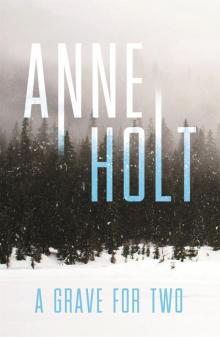 A Grave for Two
A Grave for Two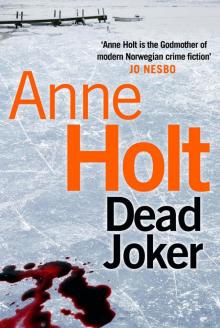 Dead Joker
Dead Joker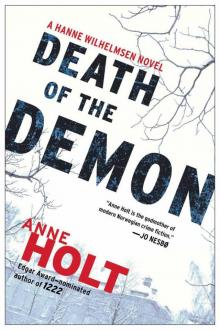 Death of the Demon: A Hanne Wilhelmsen Novel
Death of the Demon: A Hanne Wilhelmsen Novel Punishment aka What Is Mine
Punishment aka What Is Mine Beyond the Truth
Beyond the Truth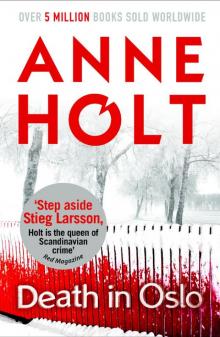 Death in Oslo
Death in Oslo The Blind Goddess
The Blind Goddess What Never Happens
What Never Happens 1222
1222 In Dust and Ashes
In Dust and Ashes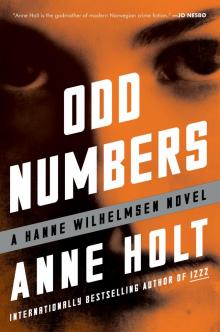 Odd Numbers
Odd Numbers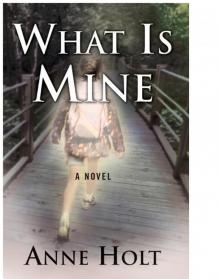 What is Mine
What is Mine What Dark Clouds Hide
What Dark Clouds Hide Blessed Are Those Who Thirst
Blessed Are Those Who Thirst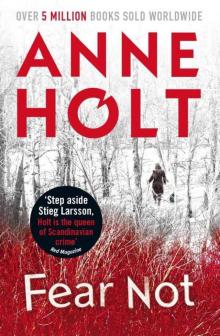 Fear Not
Fear Not No Echo
No Echo Hanne Wilhelmsen - 01 - The Blind Goddess
Hanne Wilhelmsen - 01 - The Blind Goddess